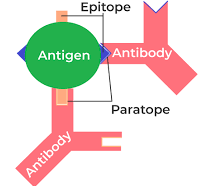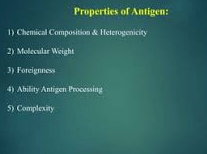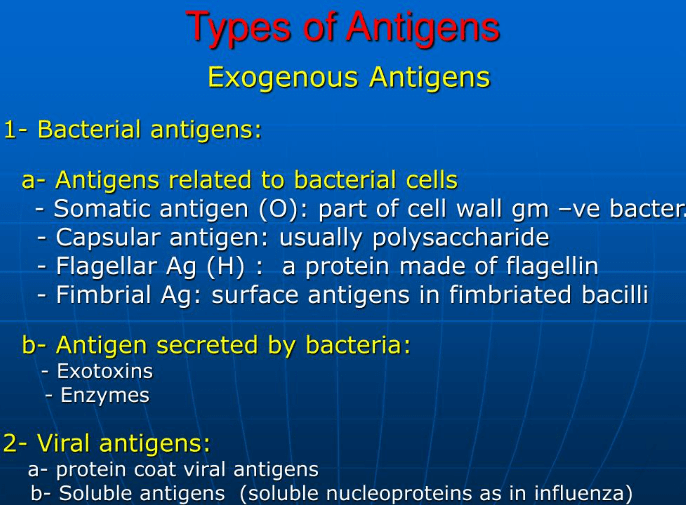What are Antigens?
The substances that stimulate the immune response in the body, Initiating the production of Antibodies or immune cells are known as antigens.
Antigens are molecules commonly Proteins or polysaccharides that are able to stimulate immune reaction in the body, specifically for the production of antibodies.
They can be external agents like bacteria, toxic substances, viruses as well as native elements/Intrinsic compounds For example proteins, from injured cells or cancer cells.
Antigens are identified by the immune system as “non-self” and activates the immune response to remove or neutralize them.
For example:
When you eat something that your body is allergic to, like peanuts, your immune system may react by releasing chemicals that cause itching, swelling, or even difficulty breathing.
Another Example is
when a small sharp woody object enters your skin accidently body reacts by generating specialized cells to encapsulate and expel the foreign object, preventing infection and promoting healing.
Structure of Antigens:
Antigens can have varied structures, ranging from simple molecules to complex proteins. They commonly contain regions called epitopes, which are recognized by the immune system. Epitopes can be linear sequences of amino acids or conformational structures formed by folding of the antigen molecule. Antigens may also possess antigenic determinants, which are specific sites on the molecule that interact with antibodies or T-cell receptors. Additionally, antigens can have various chemical compositions, including proteins, polysaccharides, lipids, or nucleic acids, contributing to their immunogenicity and ability to provoke immune responses.
Properties of Antigens
1:Specificity: Antigens can elicit an immune response that is highly specific to their molecular structure.
2.Immunogenicity: Antigens have the ability to provoke an immune response in the body, leading to the production of antibodies or activation of immune cells.
3.Foreignness: Antigens are often foreign substances or molecules that are recognized by the immune system as “non-self,” distinguishing them from the body’s own cells and tissues.
4.Complexity: Antigens can vary greatly in size and complexity, ranging from simple molecules to large proteins or even entire microorganisms.
5.Diversity: Antigens can exist in a wide range of forms, including proteins, polysaccharides, lipids, and nucleic acids, providing the immune system with the ability to recognize and respond to diverse threats.
6.Memory induction: Antigens can trigger the immune system to develop immunological memory, allowing for a faster and more robust response upon subsequent encounters with the same antigen.
Types of antigens:
There are many types of antigens ,the few are as follows.
1.Exogenous Antigens:
The antigens that arises from exterior side of the body are known as exogenous antigens, as their name shows “Exo” means outside.
For Example: Bacteria, fungi viruses and toxic substances.
2.Endogenous Antigens:
The antigens That arises inside the body are known as endogenous antigens “Endo” means inside.
For Example: proteins from damaged or infected cells, cancer cells, or self-antigens.
3.Autoantigens:
They are self-antigens that activates immune response, in opposite to body’s own tissues primary to auto immune disease.
4.Heterologous Antigens:
The antigens which originate from different species.
For Example: The antigens from other animals or plants.
5.Heteroantigens:
These are the antigens that differ between the member of the same specie.
For Example: Blood group antigens.
6.Neoantigens:
These are the antigens which are newly formed as a result of mutations and variations in proteins, often found in cancer cells or pathogens with rapidly evolving genomes.